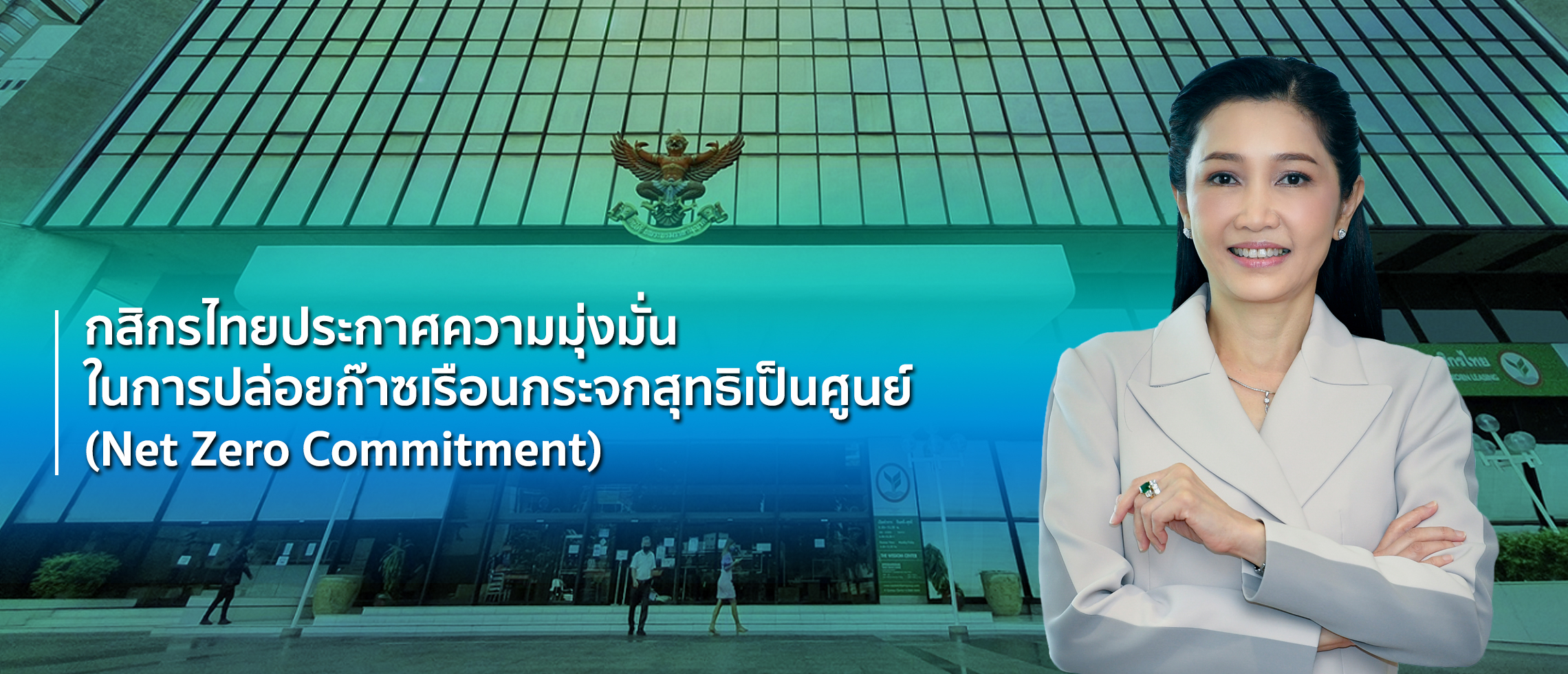NotiPass_80%K-Trade Connect will be closed on December 11, 2019 at 10:00 p.m. and resuming services on December 12, 2019 at 02:00 a.m. $More Details.%/en/announcement/Pages/SystemMaintenanceK-Trade-Connect.aspx

29 October 2021
KASIKORNBANK has announced its Net Zero Commitment
Page Content
KASIKORNBANK (KBank) has announced its Net Zero Commitment, targeting achievement of net zero in its own operations (Scope 1 and 2)* by 2030 along with net zero in its financed portfolio in line with Thailand’s aspirations. Aspiring to pioneer green banking products, the Bank has set aside at least Baht 100-200 billion in sustainable financing and investment while also supporting its customers on their decarbonization journeys. Along with these endeavors, KBank will contribute to the global effort to transition to net zero emission by 2050 so as to mitigate impacts of climate change in alignment with the Paris Agreement goals.
Ms. Kattiya Indaravijaya, Chief Executive Officer, KASIKORNBANK, said that due to the Bank’s commitment to be the leading sustainable bank in Thailand, the Bank will contribute to the global effort to transition to net zero emission, with the aim of mitigating impacts of climate change, and supporting Thailand and the Bank’s clients in regional economies to work together in making the transition towards a net zero emission economy. KBank’s Board of Directors has resolved to announce the Bank’s Net Zero Commitment, as follows:
- KBank aims to empower every customer’s life and business. We support our customers in the transition to a net zero economy. Sustainability is deeply ingrained in how we serve our customers and manage our operations.
- We are committed to supporting Thailand and our clients in regional economies on their decarbonization journeys. We will contribute to the global effort to transition to net zero emission by 2050 and will align with the Paris Agreement goals.
- We are committed to be the leading sustainable bank in Thailand, allocating at least Baht 100-200 billion in sustainable financing and investment by 2030 and pioneering green banking products.
- We commit to becoming net zero in our own operations (Scope 1, 2)* by 2030. We commit to achieving net zero in our financed portfolio in line with Thailand’s aspirations, accelerating this journey where possible. We will continually assess opportunities to take earlier actions as the technology, regulatory environment and external context evolves.
Ms. Kattiya added that the Bank is confident of its operations based on the principles of a Bank of Sustainability, with emphasis continuously placed not only on the environment, but also society and corporate governance. The Bank attaches importance to financial inclusion and literacy, as well as respect for human rights, and care for employees, communities and society under its business operations based on the principles of good governance. Additionally the Bank always focuses on market conduct, cyber security and customer’s data privacy protection. All of these factors will eventually lead to sustainable benefits to all stakeholders. The Bank believes that sustainability cannot be achieved by any single organization alone; cooperative actions are thus essential. The Bank is ready to be part of this global effort to ensure that such change is possible, so that a balanced and sustainable world can be passed on to the next generations.
*Definition of Greenhouse Gas (GHG) emissions calculation
Scope 1: Direct emissions from the activities of an organization including stationary combustion, fleet vehicles (organization-owned), chemical treatment of wastewater, as well as fugitive and process emissions.
Scope 2: Energy-indirect emissions including an organization’s purchased energy such as electricity, heat and steam.
Data source: http://thaicarbonlabel.tgo.or.th/index.php?lang=TH&mod=YjNKbllXNXBlbUYwYVc5dVgybHo